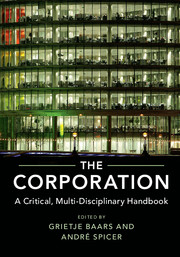Book contents
- Frontmatter
- Contents
- List of Contributors
- Acknowledgements
- Introduction: Why the Corporation?
- PART I DISCIPLINARY OVERVIEWS
- 1 The Corporation in History
- 2 The Corporation in Legal Studies
- 3 The Corporation in Economics
- 4 The Corporation in Sociology
- 5 The Corporation in Anthropology
- 6 The Corporation in Political Science
- 7 The Corporation in Geography
- 8 The Corporation in Accounting
- 9 The Corporation in Management Studies
- PART II INTERDISCIPLINARY THEMATIC CHAPTERS
- 1 The Evolution of the Corporate Form
- 2 The Multinational Corporate Group
- 3 The Financialization of the Corporation
- 4 Corporate Value Chains
- 5 Corporate Citizenship
- 6 The Corporation and Crime
- 7 The Corporation and Ideology
- 8 Corporation and Communities
- 9 Corporations and Resistance
- 10 Alternatives to the Corporation
- Index
- References
5 - The Corporation in Anthropology
from PART I - DISCIPLINARY OVERVIEWS
Published online by Cambridge University Press: 31 March 2017
- Frontmatter
- Contents
- List of Contributors
- Acknowledgements
- Introduction: Why the Corporation?
- PART I DISCIPLINARY OVERVIEWS
- 1 The Corporation in History
- 2 The Corporation in Legal Studies
- 3 The Corporation in Economics
- 4 The Corporation in Sociology
- 5 The Corporation in Anthropology
- 6 The Corporation in Political Science
- 7 The Corporation in Geography
- 8 The Corporation in Accounting
- 9 The Corporation in Management Studies
- PART II INTERDISCIPLINARY THEMATIC CHAPTERS
- 1 The Evolution of the Corporate Form
- 2 The Multinational Corporate Group
- 3 The Financialization of the Corporation
- 4 Corporate Value Chains
- 5 Corporate Citizenship
- 6 The Corporation and Crime
- 7 The Corporation and Ideology
- 8 Corporation and Communities
- 9 Corporations and Resistance
- 10 Alternatives to the Corporation
- Index
- References
Summary
I weigh my words, when I say that in my judgment the limited liability corporation is the greatest single discovery of modern times, whether you judge it by its social, by its ethical, by its industrial, or, in the long run – after we understand it and know how to use it, – by its political effects. Even steam and electricity are far less important than the limited liability corporation, and they would be reduced to comparative impotence without it.
Nicholas Murray Butler (1912: 82)Introduction: A Mere Property Career?
How are we to understand and make use of the modern business corporation? This question is coeval with the emergence of anthropology as a distinctive scholarly pursuit at the end of the nineteenth century. In 1877, Lewis Henry Morgan, an attorney whose studies of Iroquois society and culture helped to found American anthropology, published his celebrated book Ancient Society: Researches into the Lines of human Progress from Savagery, through Barbarism to Civilization. Morgan concluded his sweeping history of ‘human progress’ with a sober warning that continues to merit quotation at length:
Since the advent of civilization, the outgrowth of property has been so immense, its forms so diversified, its uses so expanding and its management so intelligent in the interests of its owners, that it has become, on the part of the people, an unmanageable power. The human mind stands bewildered in the presence of its own creation. The time will come, nevertheless, when human intelligence will rise to the mastery over property, and define the rights of the state to the property it protects, as well as the obligations and the limits of the rights of its owners. The interests of society are paramount to individual members, and the two must be brought into just and harmonious relations. A mere property career is not the final destiny of mankind, if progress is to be the law of the future as it has been of the past…. The dissolution of society bids fair to become the termination of a career of which property is the end and aim; because such a career contains the elements of self-destruction.
(Morgan, 1978 [1877]: 552)- Type
- Chapter
- Information
- The CorporationA Critical, Multi-Disciplinary Handbook, pp. 111 - 133Publisher: Cambridge University PressPrint publication year: 2017
References
- 2
- Cited by



